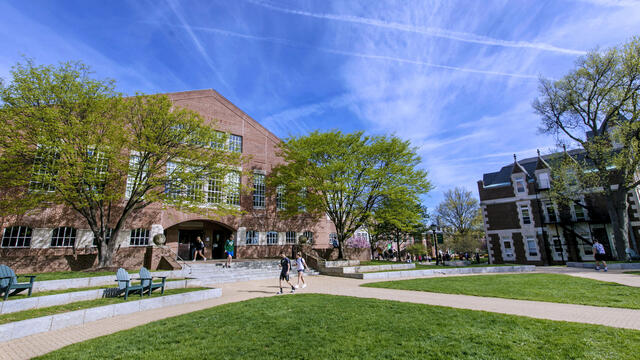Encore: Juniors return to First Year Seminar as peer mentors
Juniors Taylor Hoey and Matt Hopson are enrolled in another round of the First Year Seminar “Rebels in Early America” — and History professor Stephen Feeley couldn’t be more pleased to have them back in his class. The close friends met in “Rebels” as freshmen and leaped at the opportunity for a return engagement, this time as peer mentors to a brand new group of McDaniel first-year students.

Juniors Taylor Hoey and Matt Hopson are enrolled in another round of the First Year Seminar “Rebels in Early America” — and History professor Stephen Feeley couldn’t be more pleased to have them back in his class.
The close friends met in “Rebels” as freshmen and leaped at the opportunity for a return engagement, this time as peer mentors to a brand new group of McDaniel first-year students. They both are history buffs — Hopson of Middletown, Md., is a History major and Hoey of Westminster, Md., added a History minor to her Business Administration major.
Hoey and Hopson knew that class was bound to be lively and exciting since the course centers on playing the parts of actual Revolutionary rebels and dissenters in two Reacting to the Past games, “The Trial of Anne Hutchinson” and “Patriots, Loyalists and Revolution in New York City, 1775-1776.” They knew too that there was no predicting outcomes or discoveries in this course anchored in a deep dive into content to fuel the required role playing.
But it was more than their fascination with America’s revolutionary spirit that lured them back to “Rebels.”
As peer mentors, their role is to help and support the new students as they learn the invaluable lessons of researching a topic or character, thinking critically, arguing a point or position and presenting in a paper or debate or speech. Seasoned students, Hoey and Hopson also serve as guides outside of class to this group of first-year students, fostering their transition from high school to college academically, socially and, to some extent, personally.
“It’s been a great experience for me to be with them from the beginning in orientation before classes started to now when the semester is almost over,” says Hopson. “At this point, they have a lot fewer questions than they did at the beginning and seem much more comfortable and ready to explore. I hope that means we’ve done our job well.”
As a History professor, Feeley certainly wants his FYS students to examine rebellion and dissent in early America. But at this level he’s more interested in his students learning the skills that will help them succeed not only in college but in life.
“My main goal is for them to learn how to think on their feet — to debate in real time as issues are thrown at them,” Feeley says. “They need to learn how to assimilate information and process it quickly, to analyze and develop a solid plan of action and to convince other people to go along with them.”
To this end, the students, as characters in Revolutionary America, make formal presentations, debate issues and controversies in class, negotiate deals and write papers that are posted online for class discussions.
Feeley put Hoey and Hopson in charge of helping his students transition to college, and they have met his every expectation.
“I can have a general idea, send them an email about it and I know three days later they’ll show me a concrete plan, whether it centers on the personal needs of a student or working with the factions involved in role playing,” says Feeley, who along with the first-year team gave them the special permission required for both to serve as peer mentors in his FYS instead of having just one peer mentor.
Hoey always knew she wanted to serve as a peer mentor — she says she wouldn’t have wanted to miss her own first-year experience and credits the skills she learned with providing a strong foundation for her success in college.
As the semester comes to a close, she sees the positive changes in her mentees.
“My own experience as a freshman in this FYS was so rewarding in how it helped me adjust and make the transition from high school to college, academically as well as socially,” says Hoey, who credits professor Feeley with strengthening her writing through his liberal use of comments no matter if the paper rated an A or C. “And now, it’s just as fulfilling to have connected with this group of students and to be part of their first college experience.
“It’s important for college students to be able to present themselves well, and it is rewarding to have played a part in that.”
Read about more First Year Seminars:
- First-year students discover unseen math in puzzles and games
-
Students gain storytelling powers in Marvel-themed First Year Seminar
-
First-year students examine ‘Game of Thrones’ through Shakespeare’s lens
-
The Force is with first-year students probing the psychology of ‘Star Wars’
-
First year students learn through play as they tinker with discovery
-
Art on the Edge students parade their art to speak out on social issues